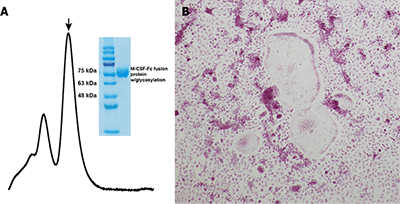Product Name: Macrophage Colony Stimulating Factor (M-CSF) (E. coli-expressed, Active)
Catalog Number: LT13501
Product Size: 25µg
Transportation method:Shipped at Room temp
Uniprot ACC#: P09603
Subcategory:CSF-1, M-CSF, mCSF-1, mM-CSF
Amino acid sequence: E. coli-derived Macrophage Colony Stimulating Factor protein
Macrophage Colony Stimulating Factor (M-CSF), also known as CSF-1, can be produced by a number of cells, including fibroblasts, monocytes, activated macrophages, secretory epithelial cells of the endometrium, endothelial cells activated by LPS or cytokines, and bone marrow stromal cells. In addition to its namesake activity, M-CSF can stimulate the proliferation of isolated macrophages, augment the production and release of cytokines and other inflammatory modulators from macrophages, enhance macrophage antibody-dependent cell-mediated cytotoxicity, prime and enhance macrophages in their ability to kill tumor cells and other microorganisms, stimulate pinocytosis, and support osteoclast differentiation. M-CSF binds and activates a 165 kDa glycoprotein of the receptor tyrosine kinase subclass III or the RTK subfamily. Due to the alternative splicing of a single M-CSF gene and due to variations in glycosylation, the molecular weight of natural soluble M-CSF ranges from 44-86 kDa. Human and mouse M-CSF share approximately 80% sequence homology in the conserved N-terminal region of 150 amino acids. Although human M-CSF is active in murine systems, mouse M-CSF appears to be species-specific in its actions.
Measured by its ability to induce osteoclast differentiation of RAW 264.7 mouse monocyte/macrophage cells. The ED50 for this effect is 30ng/mL.
Formulation: The m-CSF protein was lyophilized from a 0.2µgm filtered concentrated solution in PBS with 0.1% FBS.
Physical Appearance: Sterile Filtered White lyophilized (freeze-dried) powder.
Purity: Greater than 95.0% as determined by: (a) Analysis by RP-HPLC. (b) Analysis by SDS-PAGE.
Source:Escherichia Coli.
Stability: Lyophilized m-CSF although stable at room temperature for 3 weeks, should be stored desiccated below -18°C. Upon reconstitution m-CSF should be stored at 4°C between 2-7 days and for future use below -18°C. For long-term storage, it is recommended to add a carrier protein (0.1% HSA or BSA). Please prevent freeze-thaw cycles.
Synonyms: CSF-1, M-CSF, mCSF-1, mM-CSF
Usage: LifeTein's products are furnished for LABORATORY RESEARCH USE ONLY. The product may not be used as drugs, agricultural or pesticidal products, food additives, or household chemicals.

A. The size-exclusion chromatography of recombinant mouse M-CSF/Fc chimera protein and the SDS-PAGE analysis. B. The bone marrow-derived monocytes were cultured in the presence of M-CSF (30 ng/m) and RANKL (50 ng/ml for 6 days. The cells were then fixed with 4% PFA and stained with a TRAP solution. The image showed the formation of big multiple nucleus TRAP-positive osteoclasts formed after M-CSF and RANKL stimulation.